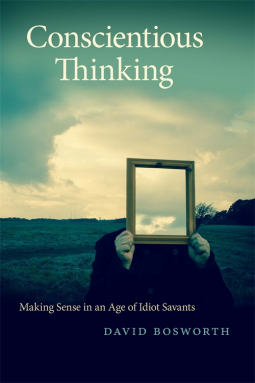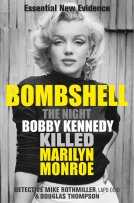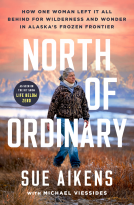
Conscientious Thinking
Making Sense in an Age of Idiot Savants
by David Bosworth
This title was previously available on NetGalley and is now archived.
Send NetGalley books directly to your Kindle or Kindle app
1
To read on a Kindle or Kindle app, please add kindle@netgalley.com as an approved email address to receive files in your Amazon account. Click here for step-by-step instructions.
2
Also find your Kindle email address within your Amazon account, and enter it here.
Pub Date Feb 01 2017 | Archive Date Mar 15 2017
Description
In Conscientious Thinking, David Bosworth cuts through all the noise of today’s political dysfunction and cultural wars to sound the deeper causes of our discontent. Americans are living, he argues, in a profoundly transitional era, one in which the commonsense beliefs of the first truly modern society are being undermined by the still crude but irreversible forces set loose by technology’s drastic revision of our everyday lives. He shows how this disruptive conflict between modern and post-modern modes of reasoning can be found in all advanced fields, including art, medicine, and science, and then traces its impact on our daily actions through such changes as the ways in which friends relate, money is made, crimes are committed, and mates are chosen.
Just as feudal values had to give way to a modern worldview that more effectively contained the new social reality generated by the printed book, so must our democracy reimagine itself in ways that can domesticate—civilize rather than merely “monetize”—a post-modern scene radically transformed by our digital machines. To that end, Conscientious Thinking supplies not only the means to make sense of our contentious times but also a provisional sketch of what a desirable post-modern America might look like.
A Note From the Publisher
Advance Praise
—Kent Meyers, author of Twisted Tree
"David Bosworth is a first-rate cultural critic who brings to
vivid life the full range of issues confronting us at the present
moment. To read him on what has lately happened in American society is
to become suddenly alert to the interpenetration of political, economic,
and cultural forces and to the fact that the most important questions
we face are not primarily political in nature, however they may seem in a
media-saturated age. Though Bosworth operates comfortably within the
discourse of the academic left, he is by no means the prisoner of an
ideological constituency. In fact he writes with extraordinary grace and
lucidity and calls to mind the work of earlier practitioners like
Christopher Lasch, Jacques Ellul, and David Riesman, each of them
notable for their cogency and for combining a devotion to understanding
the past with a passion for confronting the present."
—Robert Boyers, editor, Salmagundi
"Conscientious Thinking extends and deepens the important criticism undertaken in The Demise of Virtue in Virtual America.
Together these books firmly establish David Bosworth as one of our most
insightful social critics. The analysis provided here is both timely
and necessary. Not only does it appear on the heels of the manifest
failures wrought by a highly rationalized economic orthodoxy; it also
walks straight into the farce of our current political dysfunction. And
the speech it delivers is crucial to the action playing out before us.
Bosworth’s critique of specialization and the dangers of its obfuscating
language is as good as any I have encountered. In prose at once elegant
and precise—and oftentimes amusing—he tells us that we are paying a
very high price for our willingness to be wowed by clever fools. It is
our good luck that Bosworth doesn’t suffer them gladly. This book is a
real contribution; it is a helpful advisor and a kindly guide in
confused times."
—Jason Peters, editor of Wendell Berry: Life and Work
"Refusing to divorce questions of ethics from those of economics
and aesthetics, Bosworth models a fearless and passionate
transcendentalism for the twenty-first century. Conscientious Thinking is an intellectual tonic, keen and bracing, that yokes the arts and sciences as few books have done."
—Anne Goldman, author of Continental Divides: Revisioning American Literature
"David Bosworth has a scary-smart way of writing
pithy-but-gracious paragraphs covering entire arrays of knowledge and
facts. His piece on Henry Ford, for example, stuns in part because it
catches the deep-seated reasons why so many Americans thought of Ford as
a sort of lesser god—reasons that still annoy educated readers who
cannot even begin to figure out Fordism, or Ford himself."
—John R. Stilgoe, author of What Is Landscape?
"Bosworth's panoramic sweep—from Henry Ford to Andy Warhol to
Richard Dawkins—argues for how much intellectual history the essay can
contain. Driven by a passionate mind, this work digs through the ruins
of what he terms our 'Idiot Savant' cultural moment seeking a path
toward 'reintegration of the self with society and nature,' a cry in the
wilderness for wisdom."
—Alison Hawthorne Deming, author of Zoologies: On Animals and the Human Spirit
"David Bosworth is not only one of the sharpest, most perceptive
cultural critics around, he has even come up with a way we might think
our way out of the mess we are in. His argument is powerful and worth
pondering. No one who cares about the condition of our culture can
afford to ignore Conscientious Thinking."
—Jackson Lears, editor, Raritan
Available Editions
| EDITION | Other Format |
| ISBN | 9780820350653 |
| PRICE | $29.95 (USD) |
| PAGES | 272 |
Links
Average rating from 3 members
Featured Reviews
 Anne M, Reviewer
Anne M, Reviewer
This is not an easy book to read - or to review - but it is worth the effort. I have read and reread passages and still ponder some of the author's ideas. Mr Bosworth uses the term "idiot savant" to challenge some esteemed thinkers and ask if they are of value. I had no idea Henry Ford was such a character until I read the chapters here devoted to him. Some of his parties must have been fascinating even if they don't all show Ford in a great light looking back.
I particularly enjoyed the chapters on Harold Bloom as I have read many of his books of literary criticism. The thing I most liked about Mr Bosworth's analysis was that I came away reassured that I didn't have to beat myself up for not understanding all that Bloom writes. There is a lot of learning in here and many writers and intellectuals are named and quoted and I think I will be following up on some of the people and ideas in the months ahead. Recommended if you sometimes find yourself lost among "the greats" and want something reassuring but difficult that will make you think with every page.
I was given a copy of this book by Netgalley in return for an honest review.
Readers who liked this book also liked:
John Kotter; Holger Rathgeber
Business, Leadership, Finance, Nonfiction (Adult)








